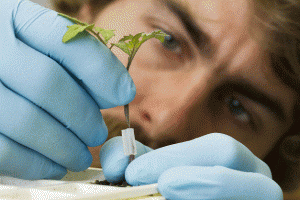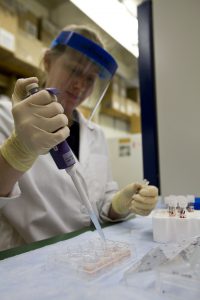By Dr. Chris J. Mortensen
Is modern science flawed? For in the office directly next to me sits a brilliant geneticist. Within my own building, sits one of the world ’s most recognized animal reproductive biologists. Both have made important contributions to science. So much so that I believe they have made important and positive world-changing discoveries. Yet, should I be more suspicious of them? Should I not believe them when they share their research? This is not to say I have not had disagreements with them over scientific concepts. Indeed, debate and discussion is healthy for science. What I am asking is…should I join the majority of the country in not thinking them trustworthy?
Public Perceptions of Science
A recent article opened my eyes to a large portion of distrust of science and scientists in the United States. According to the article, when consumers were surveyed on level of trust for information on food production, only 44% trusted the information provided by the academic community.1 The percentage of people who considered the following as trustworthy for food production information was:
- Friends/Family 57%
- Medical Community 54%
- Farmers/Ranchers 53%
- USDA 52%
- Mass media/news 30%
- Bloggers/Social media 25%
- Politicians 19%
As a scientist I was truly taken back. Academics only ranked above mass media by 14%. This level of distrust is not just isolated to food production either. Other general polls have shown only 45% of Americans trust science or scientists.2 Furthermore, this is not isolated to the United States. Across the world there is a level of suspicion of science across many disciplines.3
Science Explained
In my profession as a researcher we live in a world of facts and evidence. Skepticism is a core tenant. We need evidence (lots of it) to convince us if an idea is valid. I continually remind my students that one compelling study is not enough. It should take mountains of evidence to convince you. When we design our research studies, we must carefully craft them to ensure:
- They are not biased
- Comply with universally accepted ethics and laws
- Properly designed (robust)
- Results are repeatable
After a study, scientist attempt to publish their results in a scientific journal. Each article must go through a rigorous peer-review process. During this process, the article is evaluated by other scientists in that discipline. In my own fields (reproductive biology & education) I review one to two articles a month. I carefully read the article with a skeptical eye. If the study was poorly designed, or the evidence is not strong enough, I submit a recommendation that the article not be published. Across academia this is standard practice and serves as a gateway to sharing discoveries. Therefore, it is difficult for me as a scientist to fully understand why the public has such a high level of distrust. There are checks and balances within academia to ensure the research we share is carefully vetted.
Research Misconduct
Is this public distrust due to perceived research misconduct? Can it be that many of my peers across academia are conducting biased research? Are many of the studies being conducted fraudulent? The media is quick to highlight an example of research misconduct, whether real or perceived. Again, as someone who deals in facts, the evidence is lacking. Of the tens of thousands research articles published yearly, less than 0.01% are ever retracted for research misconduct.4
This is not to say that fraud does not happen. It does, and there are examples where fraud has had dire consequences. Some instances of fraud have led to massive waste in research funding or created public health crises. Again, this is why many of us in academia hold ourselves, our peers and students to such high standards. Integrity of our research and teaching programs are paramount. In academia, once you lose your integrity your career is essentially over. Many of us have dedicated ourselves to a lifetime of learning. We are extremely passionate about our fields of study. Therefore, one must be extremely cautious when accusing someone of fraud. It should take a mountain of evidence to convince you this is in fact the case.
Scientific Literacy
Is this distrust due to gaps in scientific literacy? Does the public fully understand the scientific process? Do even our students at the University of Florida fully understand this process? It is an important question, as research in genetics, developmental biology, astrophysics, infant cognition, or other fields  can be difficult for anyone to understand. This has led to our creation of the Wild Discoveries project (www.ufwilddiscoveries.com) for our students here at UF and others interested in science. We are now teaching the basics of research to a large number of undergraduates, and reaching out to the public on how science has, and continues to improve our lives.
can be difficult for anyone to understand. This has led to our creation of the Wild Discoveries project (www.ufwilddiscoveries.com) for our students here at UF and others interested in science. We are now teaching the basics of research to a large number of undergraduates, and reaching out to the public on how science has, and continues to improve our lives.
I would argue that as someone better understands the basics of the scientific process, their trust in science improves. It does not mean you should accept every research conclusion. Indeed, stay skeptical, it is healthy for the scientific discovery process. Yet, I would ask if there are statements with strong evidence to consider the author’s conclusions. As mentioned in our other blog post, we as a species are facing innumerable challenges.5 Scientists and the public needs to come together. We must continue a healthy dialogue on research, what it means, and how it will help us overcome these challenges.
UF/IFAS Photos by Tyler Jones
- L. Capper, J.W. Yancey. 2015. Communication animal science to the general public. Animal Frontiers 5: 28-35 https://dl.sciencesocieties.org/publications/af/abstracts/5/3/28
- S. Leopold. 2014. Trust in science. Clin Orthop Relat Res 472:1063-64. http://www.ncbi.nlm.nih.gov/pmc/articles/PMC3940736/
- Burrage. 2015. Shooting the messenger: the erosion of trust in science and what to do about it. J Australas Phys Eng Sci Med 38:1-3. http://dx.doi.org/10.1007/s13246-015-0335-8
- C. Fang, R.G. Steen, A. Casadevall. 2012. Misconduct accounts for the majority of retracted scientific publications. PNAS 109:17028-33. http://www.pnas.org/content/109/42/17028
- J. Mortensen. 2016. Wild Discoveries explained. https://blogs.ifas.ufl.edu/animalsciencesdept/2016/05/10/wild-discoveries-explained/
 0
0
